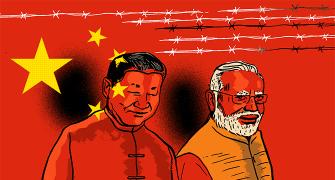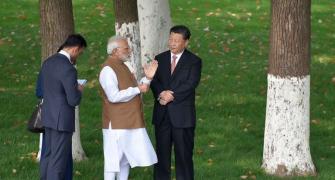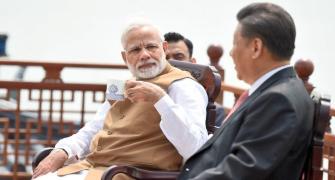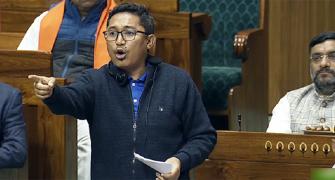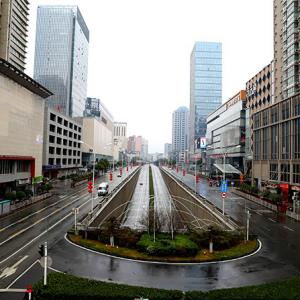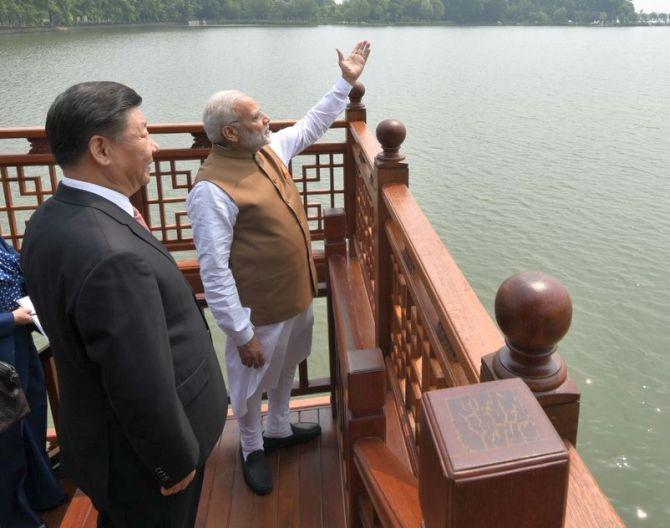Informal summits of the Camp David kind are either between equals, who perceive each other either as equals or near-equals.
Alternatively, such summits involve a ‘Big Brother’ who poses as the elder brother and a client State of whatever kind, who needs the former’s support and sympathy.
India went to Wuhan with an open mind, if not to underpin the point of the two being ‘equals’, but looking back now, China might have thought otherwise, says N Sathiya Moorthy.
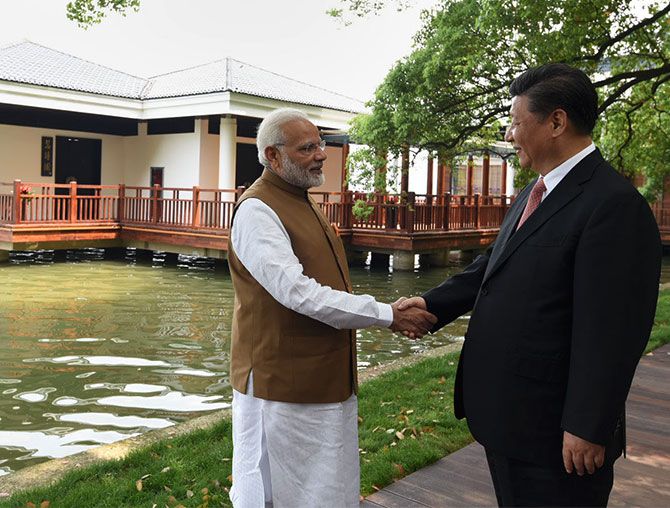
The Chinese city of Wuhan is now being mentioned for all the wrong reasons thanks to the coronavirus, but the current generation in India will remember it for the first informal summit between Prime Minister Narendra Modi and President Xi Jinping.
Be it the ‘Wuhan Spirit’ or the more recent ‘Chennai Connect’ that marked the second ‘informal summit’ between the two leaders in beachside Tamil Nadu tourist town of Mahabalipuram, the question now arises if the previous congeniality has taken the relations anywhere near normalisation, for India and Indians especially to lay their bets on a third and subsequent ones of the kind.
The reasons are not far to seek. For the second time in months, and knowing full well that there were no takers in the UNSC, even for an informal discussion and an unofficial vote, before taking it on record, China pressed its anti-India case on Article 370 abrogation and CAA.
This goes beyond even the first time attempt, which might have been dismissed as an attempt to keep anti-India Pakistan on its side, or even to show, uncharitably to Islamabad, that its past behaviour, viz, India and J&K had not won friends in the international community.
Beijing could have explained away the second attempt, if Islamabad pressed and pressured it, by citing the futility, and/or by asking Pakistan to show up or shore up the numbers in the UNSC.
China did not seem to have done either, or anything else to dissuade Pakistan and also itself not to move the UNSC informal chat-up a second time, other than to remind India and Indians that it was still very much in the game, even if the UN itself had thrown the ‘Kashmir issue’ as bilateral, at least from now on,
India’s problems with China, especially on the border issue, remains. At Mahabalipuram, the two leaders resolved to revive bilateral discussions to resolve the border dispute that had been on an off-again-on-again mode for years now.
Leaving aside bilateral concerns on either side, and also the yardstick with which the two sides wanted to identify the border, there is the continuing Chinese perception that when it came to Indian territory occupied by it, there were trilateral aspects that involved Pakistan as well.
Both China and Pakistan seem to be together at reminding India that their independent border disputes with the latter cannot be resolved without involving the other, especially in the Indian territory that Islamabad had ceded to Beijing after coming to occupy PoK.
It is a ploy that both have been at employing at every turn, though on the Pakistan front, India has not held any serious border talks with that country for decades.
For India, such an approach by the other two also goes against the grain of New Delhi’s position against ‘third-party involvement’ on Kashmir.
In the post-370 abrogation months since August last -- that is less than six months -- India has repeatedly rejected offers, proposals or statements by US President Donald Trump to ‘mediate’ between India and Pakistan on the ‘Kashmir issue’.
This is one aspect of the Indian State’s position on this or any other issue that had not changed with the passage of time or change of political leadership at the Centre, or even change of international geo-political and geo-strategic climate -- Cold War, post-Cold War and more.
At the height of the ‘Kargil war’, when then US President George Bush wanted to intervene, Prime Minister Vajpayee’s government clearly told Washington that New Delhi still stood by the Shimla accord and the more recent commitment, through the Lahore accord.
What China is indicating through its UNSC moves is a possible role for itself in helping the other two resolve J&K issue, starting as a self-styled post facto party to the dispute and ending up as a mediator/facilitator, or whatever,
If India were to accept a Chinese role as facilitator or mediator, even if remotely, then China would have established itself as the numero uno power in Asia, and also the right contender for the global superpower status, the same way the then Soviet Union had facilitated the Tashkent Summit at the height of the Indo-Pakistan War of 1965, with the US backing.
Yet, the Simla accord of 1972, after India’s decisively successful Bangladesh war a year earlier, clearly stated that the two South Asian neighbours would resolve their border disputes bilaterally and to the acknowledged exclusion of ‘third parties’ (including the UN?).
In a way, even Indians now celebrating the UN decision to declare Kashmir issue as a bilateral dispute for India and Pakistan (alone) concerned alone to discuss and decide upon may not fit into the spirit of the Simla accord.
That the Indian Parliament had resolved that all parts of J&K, including PoK (and by implication, the areas that Islamabad gave away to Beijing) were very much a constituent of the Indian Union has taken bilateral (or even trilateral) decision-making out of the ambit of the executive in India.
Parliament having declared thus, and prime ministers and governments having reiterated the position repeatedly since, there is no way any government in Delhi can compromise on the nation’s territorial integrity without an expressed resolution/constitutional amendment, passed, even if by a simple majority.
As may be recalled, the Constitution at inception has conferred the border-managing job alone to the executive, but has given the border-defining and re-defining work exclusively to Parliament.
Even if a government with a brutal majority, like the present one in Delhi, considered a full and final settlement of the India-Pakistan border dispute through a mutual give-and-take of whatever kind, the political consequences and the larger national mood of would deter them from even attempting any.
If the question is whether the two ‘informal summits’ had done any substantive good and what they had achieved that a formal (annual) summit could not have achieved, the answer may be, ‘Not much’.
There are formal and continual contacts between nations, India and China included, at the bilateral-level, to discuss trade, cultural cooperation and people-to-people contact. They are operational.
Post-Doklam, the ‘Wuhan Spirit’ may have made greater sense at the time than the ‘Chennai Connect’ more recently. The taste of the pudding is in the eating, and China’s conduct at the UNSC and elsewhere is not only not India-friendly, but it has been possibly more India-adversarial than any time post-Doklam.
The reasons are not far to seek. China is obviously fancying itself as a superpower designate, not one still in the making.
Even more, China cannot accept India as an equal in the region, the way superpower designation worked for the US and the Soviet Union at the coinage of the term.
China apes the West, the US in particular, in diplomacy and buying up third country, Third World loyalty especially, reach-out and propaganda.
They are nowhere near the US as yet on the military front, which they are seeking to compensate and fast-track the same through the setting up of ‘debt-traps’ all around, especially India.
China, along with Russia, has the veto vote in the UNSC that Third World nations, including those around India love. Not only is it not there at the UNSC high table, in the post-Cold War US company, it has also lost South Asia and the shared seas as the ‘traditional sphere of Indian influence’.
Yet, when it comes to the economy, China has set a new trend. It did not bulldoze neighbours and client-States as the Soviet Union did.
At inception of being acknowledged as a superpower after the Second World War, the US had Bretton Woods making the dollar the sole international currency.
While other nations thus had to earn every dollar, the US alone needed only to print the same. According to some studies, there are more dollar notes elsewhere across the world than in the US.
In contrast, China has earned every cent or dollar it is now spending on its own military modernisation, expansion and reach-out across oceans and to individual nations, big and small, rich or poor.
The BRI is a political message, whose full import has not been fully understood. India is nowhere there, nor it hopes to be there any time soon.
For historic reasons and otherwise, owing to political and border pragmatism and the rest, India and Indians too have a psyche that forebodes them from accepting adversarial Pakistan or even friendly neighbours as equals, or aspiring equals.
The psyche works even more for China vis-à-vis India, especially when the former sees the latter as an eternal threat to its ‘lone spot’ in the sky, again a product of Beijing’s psychological underpinning about its own self-importance, regional and global importance -- some of which it had definitely earned through hard and consistent work, not through global diktats or jack-booting (alone).
Yet, for China, ‘shared economic prosperity’, whether of the ‘debt trap’ or BRI kind, is only a means to an end -- not an end in itself.
Post-Cold War, post-economic growth, China is now going beyond the obvious as with Sri Lanka and Maldives in the immediate Indian neighbourhood, to something more substantial in geo-political terms.
Though trade and economic ties formed the seeming mainstay of President Xi’s recent Myanmar visit, the timing will remain crucial for a long time to come.
Coinciding with ICJ’s mandate on the ‘Rohingya issue’, on which ‘Nobel Peace’ laureate Aung San Suu-Kyi defended her nation’s defence, Xi’s Myanmar visit was a message to the world that his hosts could count on China at the UNSC and elsewhere, as predecessor junta rulers did in its time.
Even otherwise, informal summits of the Camp David kind are either between equals, who perceive each other either as equals or near-equals.
Alternatively, such summits involve a ‘Big Brother’ who poses as the elder brother and a client State of whatever kind, who needs the former’s support and sympathy.
India went to Wuhan with an open mind, if not to underpin the point of the two being ‘equals’, but looking back now, China might have thought otherwise.
Maybe, it is thus time now for India, starting with the incumbent leadership, to take a closer look at ‘informal summits’ of the Wuhan-Mahabalipuram kind, and generate a national consensus on substantive issues with adequate negotiating and bargaining positions, to the Chinese for any summit of this kind were to light the future direction of bilateral relations and understanding -- even if not solutions to all pending problems between the two and involving the two.
There may be otherwise nothing that formal summits, State and official visits by the two Heads of Government, their ministers and civil servants cannot achieve.
N Sathiya Moorthy, veteran journalist, and political/foreign policy analyst, is Distinguished Fellow and Head-Chennai Initiative, Observer Research Foundation. He can be contacted at sathiyam54@gmail.com

